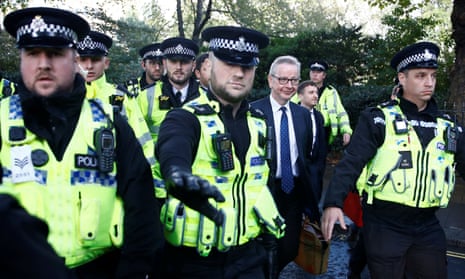A majority of voters in England, Wales and Scotland believe that the possibility of some level of violence against MPs is a “price worth paying” in order to get their way on Brexit, an academic survey has found.
The poll from Cardiff University and the University of Edinburgh asked respondents what they would be prepared to see happen in order to leave or remain within the European Union.
This included a question on whether achieving their desired political outcome was worth the risk of violence being directed against MPs.
Most leave voters who took part in the Future of England study thought such a possibility was a “price worth paying” for Brexit to be delivered – 71% in England, 60% in Scotland and 70% in Wales.
The majority of remain voters felt that the risk of violence towards MPs was worth it if it meant we would stay in the EU – 58% in England, 53% in Scotland and 56% in Wales.
The survey did not imply that the responder would conduct the violence themselve or specify that the violence would be severe or even be carried out by those on the same political side as them.
Richard Wyn Jones, a professor of Welsh politics at Cardiff University who co-directed the research, said he had been “flabbergasted” by the results, given the murder of the Labour MP Jo Cox before the referendum in 2016 and recent threats made towards other MPs.
“If we’re going into a general election in which polarisation is the name of the game, it’s very, very hard to see how you can bind these wounds,” said Wyn Jones.
Most people who responded to the survey also thought that violence towards MPs and violent protests in which people are “badly injured” were likely to occur if and when Brexit happens.
“I think this division is now existential,” Wyn Jones said. “It’s about who we think we are and who we think we’re not. It’s very hard to see how the state of the union in its current form survives Brexit.”
He added: “If we’re going into a general election in which further polarisation is a deliberate aim of the campaigning of at least some of the political parties, you do wonder in all seriousness where all of this ends.”
Of the 4,103 politically representative respondents, a significant number – 47% in Wales, 52% in England and 61% in Scotland – thought that the UK’s departure from the EU would likely lead to the breakup of the UK.
Many were also willing to see the union change substantially if it meant they would get their own way on Brexit. Among leave voters, 74% in England, the same percentage in Wales and 59% in Scotland believed the breakup of the UK would be worth it to take back control through delivering Brexit.
Similar proportions of remainers believed undermining faith in the union would be a price worth paying in order to remain in the EU.
Ailsa Henderson, a professor of political science at the University of Edinburgh and fellow co-director of the research, said the findings showed that Brexit negotiations were “putting the union under considerable strain regardless of whether we stay or go”.
She added: “Both sides are prepared to fundamentally rewrite the rules of politics as we know it to get what they want. Staying in the EU will likely decrease faith in the union. Brexit could well change its borders.”
Despite leave voters’ conviction that Brexit should be delivered at all costs, over half of people throughout all three countries thought that the nation would become substantially poorer as a result of Brexit.
However, a huge number of those who voted leave in the EU referendum believed that economic losses would be worth it – 76% in England and Scotland and 81% in Wales.
Similarly, voters overwhelmingly felt that the potential destruction of the country’s farming and fishing industries would be a price worth paying for getting the result they wanted in the Brexit negotiations.
